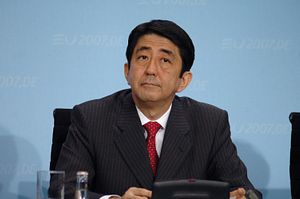Since returning as prime minister in December 2012, Shinzo Abe has pushed hard to revamp Japan’s security institutions. The revision of his country’s pacifist constitution as a prerequisite to enable participation in collective self-defense is at the core of his reform drive. In promising to “take Japan back” from the institutional constraints of the country’s postwar regime, Abe has made a constitutional amendment targeting the military-banning Article 9 his primary objective in (re)establishing a strong Japan. However, Tokyo’s new conservative establishment has shifted towards a more comprehensive strategy, introducing institutions for intelligence and security policy coordination. Essentially, Abe has laid the groundwork for a new security framework that enables Japan to take part in collective self-defense within the framework of the U.S.-Japan alliance.
On November 26, the Diet’s lower house approved a state secrecy bill which aims at tightening the government’s control over information sensitive to state legislation. The bill enables Japan’s government to designate 23 types of information relating to diplomacy, counter-terrorism or defense as “special state secrets.” Government officials, such as the personnel of Japan’s Coast Guard who had released video footage of a Chinese fishing boat colliding with two Japanese patrol vessels in 2010 near the disputed Senkaku (in Chinese Diaoyu) islands, could face up to 10 years imprisonment under the new law. However, the government has not only refrained from providing a clear definition of what constitutes a state secret, the new legislation also remains ambiguous as to who is to decide what information counts as secret. While awaiting approval from the Diet’s Upper House, the bill has triggered massive public criticism, especially among Japan’s mass media, as journalists fear state intervention in media activities and in consequence an undermining of Japan’s postwar democracy.
Abe has dismissed such claims, explaining that “this law is designed to protect the safety of the people.” In fact, the bill’s main objective is to facilitate the U.S.-Japan alliance. While Abe has declared a new strategic outlook branded “proactive pacifism,” which envisions the participation of Japan’s Self-Defense Forces in overseas peacekeeping operations, strategists in Japan consider the new legislation critical in Tokyo’s overall efforts toward gaining greater international influence.
As a second pillar of Japan’s newly evolving security architecture, on November 27 the Diet passed legislation introducing a fully institutionalized National Security Council (NSC). Led by former Ministry of Foreign Affairs official and close Abe adviser Shotaro Yachi, the council will start operations as early as December. The new council is designed to strengthen the prime minister’s office in defense and security policy as well as intelligence matters. As such, this legislation must be considered a critical step in Abe’s push for increasing Japan’s role in regional security affairs. In fact, in his address to the Japanese parliament in October, Abe specifically pointed to Japan’s changing regional security environment as the imperative for strengthening Japan’s command capabilities. Resampling the U.S., the aim of the new NSC is to overcome the various institutional barriers in Japan’s defense and security bureaucracy and to optimize intelligence gathering and analysis. These measures will speed up the process of decision-making at the prime minister’s office level. Replacing the Security Council (established 1986), the new intelligence unit is also designed to smoothen cooperation with its counterparts in Washington.
As criticism within Japan has mounted over the new security-related bills, Abe has taken advantage of his majorities in both houses of the Diet to get his new legislation passed. Current developments in Northeast Asia provide Japan’s administration with reasonable arguments in pushing for a robust security architecture. Recent incidents such as North Korean missile and nuclear tests, and China’s assertive diplomacy in Asia, will help Abe balance fears of his country embarking on a trajectory that would lead to a dysfunctional democracy. Beijing’s new assertive approach towards the Senkaku issue undermines protests against Abe’s alleged revisionist course while enabling Japanese strategists to redirect the debate towards Japan’s new security threats.
Thus, while pushing forward the development of Japan’s new security institutions, the current crisis in East Asia has most importantly helped Japan to consolidate its main security pillar, the U.S.-Japan alliance, which underwent significant turmoil throughout the three years of Democratic Party of Japan government. China’s most recent unilateral announcement of an air defense identification zone over the disputed Senkaku has prompted U.S. intervention and robust confirmation that the mutual security treatment with Japan covers the disputed territory.
Hence, as Japan is set to revise its national defense guidelines in mid-December, focusing on the enhancement of surveillance capacities of Japan’s Self-Defense Forces, a review of Japan’s self-imposed ban on arms exports as well as the commissioning of amphibious forces to protect remote islands, the current tensions in East Asia provide Abe with the momentum he needs to recalibrate Japan’s national security policy.
Sebastian Maslow is Assistant Professor for Japanese politics at the University of Heidelberg’s Centre for East Asian Studies. His research focuses on Japan’s foreign and security policy.

































